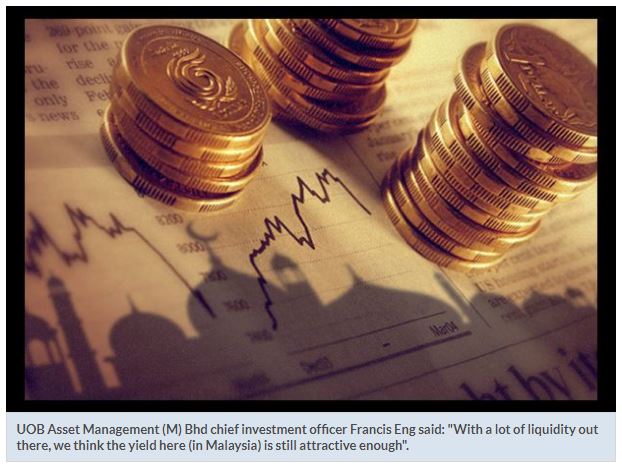Malaysia’s debt securities still attractive even if OPR cut
KUALA LUMPUR: UOB Asset Management (M) Bhd expects another Overnight Policy Rate (OPR) cut to take place this year if the Movement Control Order (MCO 2.0) is extended beyond Feb 4,2021, or stricter measures are enforced by the government.
Chief investment officer Francis Eng said however, a further interest rate reduction would not make Malaysia’s fixed income market less attractive to foreign investors.
“We are now in an environment where the global interest rates are at very low levels, and there are trillions of bonds with negative yields out there.
“With a lot of liquidity out there, we think the yield here (in Malaysia) is still attractive enough, ” he said at a virtual media briefing here today.
Currently, the benchmark Malaysian Government Securities (MGS) yield stood at about 2.70 per cent.
Last week, Bank Negara Malaysia decided to maintain the OPR at 1.75 per cent.
In his presentation earlier, Eng said Malaysia’s debt securities has not lost their shine and continued to attract foreign investors, despite the downgrade of Malaysia’s sovereign rating to BBB+ by credit ratings agency Fitch Ratings Inc last year.
“The global low interest rate environment is very supportive to Malaysia’s fixed income market.
“Unlike the equity market, we have seen foreign investors fled Malaysia in the fixed income space, (but) foreigners continue to buy Malaysian fixed income securities, ” he said.
Citing data from BNM and data provider CEIC, he said total debt securities foreign holdings in Malaysia stood at RM223.0 billion, up from RM219.4 billion in November 2020 and RM217.5 billion in October 2020.
Similarly, total debt securities monthly inflows also remained in the positive territory, with RM3.6 billion recorded in December 2020, RM1.9 billion in November 2020 and RM8.0 billion in October 2020, he added.
In terms of economic performance, Eng predicted that Malaysia’s gross domestic product (GDP) would only rebound to its pre-COVID-19 level in 2022 instead of 2021 due to the on-going MCO 2.0
“This really depends on what happen in MCO 2.0, as it is still very fluid and not easy to predict what will happen next exactly.
“But our base case is that, it will be more likely to happen (returning to pre-COVID-19 levels) in 2022, ” he said.
Overall, Eng forecasts the Asian economy would rebound past the pre-COVID-19 level in 2021, led by China, which is the first major economy to recover from COVID-19.
As for ASEAN, he expects sectors such as financial, consumer and property would benefit from the reopening of economies.
Moving forward, Eng said the global economy would be influenced by factors such as government fiscal and monetary policies which remained supportive to markets globally, as well as COVID-19 vaccine rollouts which would put the economy on the path to normalcy.
“Confluence of positive factors for Asia included the weakening US dollar and the de-escalation of trade war between the United States and China, ” he said. – Bernama
Source: https://www.thestar.com.my/business/business-news/2021/01/26/malaysia039s-debt-securities-still-attractive-even-if-opr-cut


 English
English




